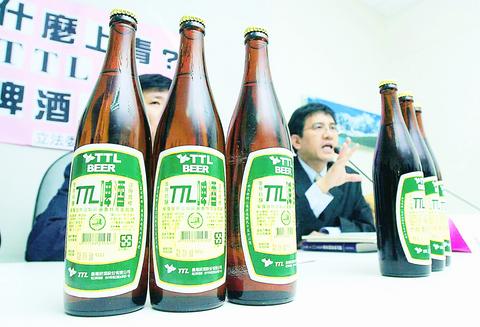DPP Legislator Tsai Chi-fang (
Tsai told a press conference that attempts to register the Taiwan Beer and Kinmen Kaoliang brands in China have reportedly been blocked by Beijing on the grounds that geographical names may not be part of trademark registrations.

PHOTO: CHIANG YING-YING, TAIPEI TIMES
"It is outrageous that unfair trade practices still exists in the alcohol trade across the Taiwan Strait now that both sides have been admitted to the WTO and Taiwan businessmen have made huge investments on the mainland," Tsai said.
He said the entry of Tsing Tao and Yanjing beer to the local market resulted in an 8-percent decrease in beer sales for the state-owned Taiwan Tobacco and Liquor Co's (TTL) last year.
Tsai said both the US and the EU have approved TTL's applications to market its beer under the "Taiwan Beer" label in those markets.
"It's unreasonable that China still does not allow us to sell Taiwan beer in its market," Tsai said.
A TTL executive told reporters that the company first tried to register its "Taiwan Beer" trademark with Chinese authorities in 1998 and then again in 2000, but both applications were rejected.
He said the company was later given approval to market the beer under the name "TTL Beer. "
The official said the company filed another application for a "Taiwan Beer" trademark last year following China and Taiwan's accession to the WTO.The Kinmen Liquor Co has reportedly encountered similar problems in trying to sell its Kinmen Kaoliang on the Chinese market because it cannot get its trademark registered.
Media reports say that TTL and Kinmen Liquor will ask the government to start negotiations with China over the trademark restrictions under the WTO framework.
Kinmen Liquor is reportedly resisting the opening of Taiwan's market to Chinese liquor products until the problem is resolved.
Media reports also note that TTL's Long Life cigarette brand was registered in China by Xunyang Tobacco and Liquor Group a few years ago, which would mean the company cannot market its cigarettes under that name in China.
Xunyang is reportedly asking for NT$30 million to release the rights to the "Long Life" name.
However, TTL markets China's Zhonghua brand cigarettes locally.
Taiwan Tobacco is reportedly negotiating with the Chinese representatives of Zhonghua cigarettes and Xunyang Tobacco to try to arrange an exchange of trademark registrations.

The US government has signed defense cooperation agreements with Japan and the Philippines to boost the deterrence capabilities of countries in the first island chain, a report by the National Security Bureau (NSB) showed. The main countries on the first island chain include the two nations and Taiwan. The bureau is to present the report at a meeting of the legislature’s Foreign Affairs and National Defense Committee tomorrow. The US military has deployed Typhon missile systems to Japan’s Yamaguchi Prefecture and Zambales province in the Philippines during their joint military exercises. It has also installed NMESIS anti-ship systems in Japan’s Okinawa

‘WIN-WIN’: The Philippines, and central and eastern European countries are important potential drone cooperation partners, Minister of Foreign Affairs Lin Chia-lung said Minister of Foreign Affairs Lin Chia-lung (林佳龍) in an interview published yesterday confirmed that there are joint ventures between Taiwan and Poland in the drone industry. Lin made the remark in an exclusive interview with the Chinese-language Liberty Times (the Taipei Times’ sister paper). The government-backed Taiwan Excellence Drone International Business Opportunities Alliance and the Polish Chamber of Unmanned Systems on Wednesday last week signed a memorandum of understanding in Poland to develop a “non-China” supply chain for drones and work together on key technologies. Asked if Taiwan prioritized Poland among central and eastern European countries in drone collaboration, Lin

BACK TO WORK? Prosecutors said they are considering filing an appeal, while the Hsinchu City Government said it has applied for Ann Kao’s reinstatement as mayor The High Court yesterday found suspended Hsinchu mayor Ann Kao (高虹安) not guilty of embezzling assistant fees, reducing her sentence to six months in prison commutable to a fine from seven years and four months. The verdict acquitted Kao of the corruption charge, but found her guilty of causing a public official to commit document forgery. The High Prosecutors’ Office said it is reviewing the ruling and considering whether to file an appeal. The Taipei District Court in July last year sentenced Kao to seven years and four months in prison, along with a four-year deprivation of civil rights, for contravening the Anti-Corruption

NO CONFIDENCE MOTION? The premier said that being toppled by the legislature for defending the Constitution would be a democratic badge of honor for him Premier Cho Jung-tai (卓榮泰) yesterday announced that the Cabinet would not countersign the amendments to the local revenue-sharing law passed by the Legislative Yuan last month. Cho said the decision not to countersign the amendments to the Act Governing the Allocation of Government Revenues and Expenditures (財政收支劃分法) was made in accordance with the Constitution. “The decision aims to safeguard our Constitution,” he said. The Constitution stipulates the president shall, in accordance with law, promulgate laws and issue mandates with the countersignature of the head of the Executive Yuan, or with the countersignatures of both the head of the Executive Yuan and ministers or